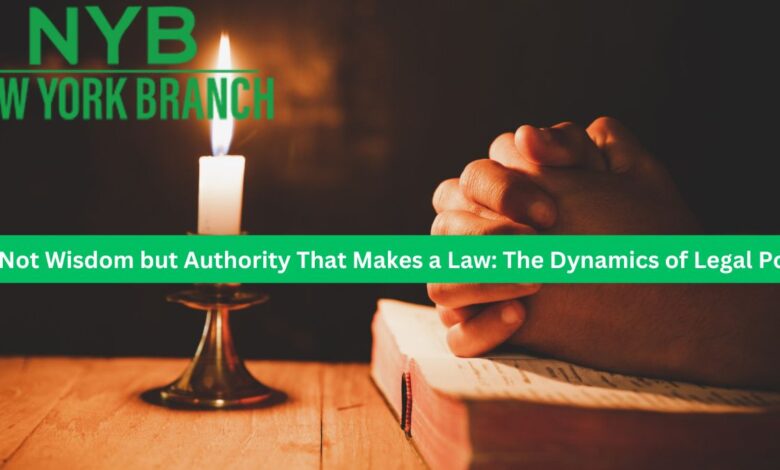It is Not Wisdom but Authority That Makes a Law: The Dynamics of Legal Power

The axiom “It is not wisdom but authority that makes a law. T – Tymoff, encapsulates a profound critique of the legal systems governing societies around the world. This statement challenges the idealistic notion that laws are always the product of reasoned deliberation and moral wisdom. Instead, it posits that the essence of lawmaking lies in the power and authority of those who enact them. This article delves into the complexities of this assertion, exploring the interplay between It is not wisdom but authority that makes a law. T – Tymoff, authority, and the creation of laws. We will examine historical contexts, analyze contemporary implications, and consider the balance between authoritative power and the pursuit of wise, just legal frameworks.
The Nature of Authority in Lawmaking
Authority, in the context of lawmaking, is the power or right to enact laws, command obedience, or make final decisions. This power is vested in various entities such as legislative bodies, monarchs, or dictatorial regimes, depending on the governance structure of a society. The legitimacy of this authority can stem from different sources: democratic election, divine right, military strength, or even tradition. However, the source of authority does not inherently guarantee the wisdom of the laws enacted.
Historically, the authority to make laws has often been concentrated in the hands of the few — be it a monarch, a select group of elites, or a single political party. This concentration of power has not always aligned with the pursuit of wise, just, or equitable laws. For instance, laws that enforced segregation, denied women the right to vote, or criminalized homosexuality were products of their times’ authoritative powers, reflecting prevailing prejudices rather than enlightened wisdom.
The Role of Wisdom in Lawmaking
Wisdom, in contrast to authority, is about the quality of having experience, knowledge, and good judgment; it’s the soundness of an action or decision with regard to the application of such experience, knowledge, and judgment. In the ideal scenario, laws should be the embodiment of collective wisdom, aimed at promoting the common good, ensuring justice, and protecting freedoms.
The challenge arises when of the lawmaking process is overshadowed by the interests, biases, or whims of those in power. The ideal of laws as the crystallization of societal often clashes with the reality that laws can also serve as tools for maintaining power structures, oppressing minorities, or advancing specific agendas that may not align with the broader public interest.
Historical Perspectives on Authority and Wisdom
The history of legal systems offers insights into the tension between authority and wisdom in lawmaking. Ancient legal codes, such as Hammurabi’s Code, were based on the authority of the ruler but also reflected the of the time in addressing issues of justice, property rights, and social order. In contrast, the laws of authoritarian regimes in the 20th century often reflected the will and interests of the ruling elite rather than any profound wisdom or ethical considerations.
The development of democratic systems introduced mechanisms intended to balance authority and wisdom, such as separation of powers, checks and balances, and the role of judicial review. These mechanisms aim to prevent the abuse of legislative power and ensure that laws reflect not just the will of the majority but also the principles of justice, equity, and respect for minority rights.
Contemporary Challenges in Balancing Authority and Wisdom
In the modern world, the tension between authority and wisdom in lawmaking manifests in various forms. Issues such as digital privacy, environmental protection, and human rights present complex challenges that require wise legal responses. However, the rapid pace of technological and social change often outstrips the ability of legislative processes, rooted in authority, to adapt in a timely and wise manner.
Moreover, the influence of powerful interest groups, the polarization of political discourse, and the spread of misinformation can distort the lawmaking process, prioritizing authority over wisdom. Laws that emerge from such a process may lack the foresight and ethical foundation necessary to address the long-term needs of society.
The Path Forward: Integrating Wisdom with Authority
The realization that authority alone does not suffice for the creation of just and wise laws leads to the question of how societies can better integrate wisdom into the lawmaking process. Several approaches can be considered:
Enhancing Democratic Participation: By broadening the base of participation in the democratic process, laws are more likely to reflect the collective wisdom and diverse perspectives of the populace rather than the narrow interests of the powerful.
Strengthening Institutions: Robust, independent institutions that can provide checks and balances on the exercise of authority are crucial. This includes a strong judiciary that can review laws for their wisdom and justice, beyond their mere legality.
Promoting Education and Civic Engagement: An informed and engaged citizenry is better equipped to hold lawmakers accountable and advocate for laws that reflect wise and ethical considerations.
Encouraging Dialogue and Deliberation: Mechanisms for public deliberation that involve a wide range of stakeholders can help ensure that laws are the product of collective reasoning and reflection rather than unilateral authority.
Conclusion:
The statement “It is not wisdom but authority that makes a law” serves as a poignant reminder of the complexities and challenges inherent in the lawmaking process. While authority is a necessary component of governance, the pursuit of wisdom in lawmaking is essential for creating just, equitable, and effective legal systems. Balancing these elements requires ongoing effort, vigilance, and a commitment to democratic principles, institutional integrity, and the common good. As societies continue to evolve, the dialogue between authority and wisdom in shaping the laws that govern us will remain a critical arena for reflection, debate, and action.



